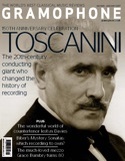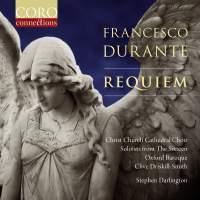Texte paru dans: / Appeared in: |
|
|
Outil de traduction (Très approximatif) |
|
|
Reviewer:
David Vickers
Francesco Durante (1684-1755) made a profound mark on musical culture in early-18th-century Naples. His pupils at the city’s prestigious conservatories included Pergolesi, Traetta, Piccinni and Paisiello. A renowned composer of sacred music, Durante wrote at least three Requiems; an elaborate setting in C minor dated 1746 was probably written for Rome’s S Giacomo degli Spagnoli (in the Piazza Navona) to commemorate the recently deceased Philip V of Spain. More than 50 manuscript copies are dotted around the world, some of them written out as late as 1871, but the work has never been published. It has been edited for this recording by Stephen Darlington, who praises the way Durante’s music combines ‘mastery of counterpoint with an elegance of melody, a richness of harmony and a structural instinct’. Sometimes singing in five parts and elsewhere in eight, Christ Church Cathedral Choir are on superb form in this skilfully woven music. The assured boy choristers are balanced elegantly with the unforced ease of the adult lay clerks. Durante’s string accompaniments are astutely varied and played by Oxford Baroque with perfect sincerity and stylistic finesse; an obvious dramatic trick is reeling downward spirals that insinuate hints of fire and brimstone in ‘Dies irae’ and ‘Quid sum miser’. The only departure from economical orchestral scoring is a subtle pair of natural horns used to splendid effect in ‘Tuba mirum’, an attractive soprano aria sung limpidly by Alexandra Kidgell. The plaintive quintet of soloists (drawn from The Sixteen), anguished choral supplications and Oxford Baroque’s players are articulately expressive in the vivid contrasts during ‘Ingemisco tamquam reus’. The suspension-laden passages for solo voices in ‘Lacrimosa’, unfurling choral lines in ‘Benedictus’ and imaginative harmonic twists in ‘Libera me’ all reveal hints of why the 18th-century music historian Charles Burney acclaimed Durante as the greatest harmonist of his time. |
|
|
Support us financially by purchasing this disc from eiher one of these
suppliers. |
|
|
|
|
|
Cliquez l'un ou l'autre
bouton pour découvrir bien d'autres critiques de CD |
|




